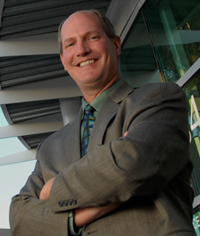We are happy to have Matt Barth, Yeager Families Chair, and CE-CERT Director as our guest blogger today. Matt brings insight to the changing policies in California and what they will mean to the transportation industry:
California has its hands full: it is still struggling with some of the most polluted and toxic air in the country, it is dealing with global climate change issues, and energy supplies are still uncertain. As a result, the state is rapidly implementing policies to deal with both pollutant and greenhouse gas emissions, diversifying energy supplies, and moving towards more efficient and cleaner transportation systems. One of the key initiatives that address all of these issues is the broad goal of introducing hybrid and all-electric transport options to many of our urban areas. The California of the future will be powered by more solar, wind, and recycled waste products, all of which need to be seamlessly and efficiently integrated to power our homes, vehicles and buildings. CE-CERT is excited to be a part of inventing this future California.
We have spent the last year heavily investing in our laboratories and expertise in critical areas that address this transition, including: • Renewable fuel development and use– creating energy from renewable sources and measuring its environmental and health impacts when used in our homes, industries and vehicles. • Advanced electric, hybrid, and fuel cell vehicles – understanding how best to design and efficiently use them in all kinds of applications, from school buses to commuter vehicles to heavy duty port drayage operations, as well as understanding and mitigating the potential air and toxic impacts of these new technologies. • Smartgrid technologies – developing a research testbed that will allow us to study how best to combine solar energy generation, energy storage, and electric drive transportation, and bring it to our utility provider in a manner that does not disturb our delicate grid infrastructure through load leveling and storage techniques.
Tackling the complexity of implementing such novel technologies in the real-world will require more than ever before strong partnerships from industry, government and academia. This last year CE-CERT has expanded its collaborations with other UC campuses, industries, and state and local government agencies. A key example of this is positioning ourselves to be part of two university transportation centers, one dealing with economic competitiveness, and another focusing on sustainable transportation on a national scale. We are also leveraging our newest UCR resources – our colleagues in the School of Medicine and the School of Public Policy – to tie in the perspective of the health and social impacts of these technologies. Finally, we have embraced our role in helping carry out the new UC initiative to be net zero energy user by 2025.
It is an inspirational and influential time to be involved in the transition towards a sustainable California. Thank you to our researchers, CE-CERT and UCR staff, our Board, community supporters, sponsors and industry partners for our continued success!

